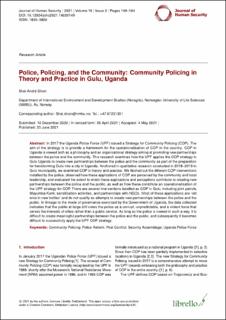| dc.contributor.author | Divon, Shai André | |
| dc.date.accessioned | 2022-03-14T08:46:28Z | |
| dc.date.available | 2022-03-14T08:46:28Z | |
| dc.date.created | 2021-06-24T13:06:23Z | |
| dc.date.issued | 2021 | |
| dc.identifier.citation | Journal of Human Security (JHS). 2021, 16 (2), 149-164. | |
| dc.identifier.issn | 1835-3800 | |
| dc.identifier.uri | https://hdl.handle.net/11250/2984952 | |
| dc.description.abstract | In 2017 the Uganda Police Force (UPF) issued a Strategy for Community Policing (COP). The aim of the strategy is to provide a framework for the operationalisation of COP in the country. COP in Uganda is viewed both as a philosophy and an organisational strategy aiming at promoting new partnerships between the police and the community. This research examines how the UPF applies the COP strategy in Gulu Uganda to create new partnerships between the police and the community as part of the preparation for transforming Gulu into a city in Uganda. Anchored in qualitative research conducted in 2018–2019 in Gulu municipality, we examined COP in theory and practice. We fleshed out the different COP interventions installed by the police, observed how these applications of COP are perceived by the community and local leadership, and evaluated the extent to which these applications and perceptions contribute to creating new partnerships between the police and the public, as well as how these constitute an operationalisation of the UPF strategy for COP. There are several interventions labelled as COP in Gulu, including joint patrols, Mayumba Kumi, sensitisation activities, and partnerships with NGOs. Most of these applications are ‘old wine in new bottles’ and do not qualify as attempts to create new partnerships between the police and the public. In linkage to the mode of governance exercised by the Government of Uganda, the data collected indicates that the public at large still views the police as a corrupt, unpredictable, and a violent force that serves the interests of elites rather than a public service. As long as the police is viewed in such a way, it is difficult to create meaningful partnerships between the police and the public, and subsequently it becomes difficult to successfully apply the UPF COP strategy. | |
| dc.language.iso | eng | |
| dc.relation.uri | http://www.librelloph.com/journalofhumansecurity/article/view/johs-16.2.149 | |
| dc.title | Police, Policing, and the Community: Community Policing in Theory and Practice in Gulu, Uganda | |
| dc.type | Peer reviewed | |
| dc.type | Journal article | |
| dc.description.version | publishedVersion | |
| dc.source.pagenumber | 149-164 | |
| dc.source.volume | 16 | |
| dc.source.journal | Journal of Human Security (JHS) | |
| dc.source.issue | 2 | |
| dc.identifier.doi | 10.12924/johs2021.16020149 | |
| dc.identifier.cristin | 1918174 | |
| dc.relation.project | EC/H2020/ICT4COP | |
| cristin.ispublished | true | |
| cristin.fulltext | original | |
| cristin.qualitycode | 1 | |
